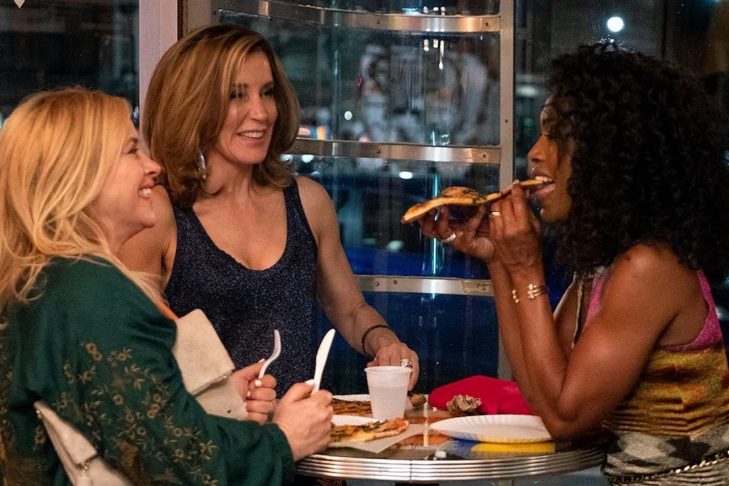“Otherhood,” new on Netflix, is an embarrassing cliché of a movie, a gauzy tissue masquerading as a story. Three middle-aged women, longtime pals who first met as parents, get tipsy on Mother’s Day and bond over their grown sons’ indifference. They then take a drunken road trip from upstate to New York City to surprise them. It’s “The First Wives Club,” minus a few chortles.
Carol Walker is played by Angela Bassett, who is mournful and dour throughout, except when drinking. She’s a widow, a frustrated artist who volunteers a couple days a week at a retirement community. Her son, Matt (Sinqua Walls), is a Dartmouth grad not living up to his potential, working as an art director at All Balls magazine, a Playboy equivalent. He lives in a designer apartment and maintains a sneaker closet the size of many homes.
Gillian Lieberman is Patricia Arquette in a Bette Midler role, the token frumpy-hippie Jewish mom who—surprise!—is thoroughly distraught over the fact that her son, Daniel (Jake Hoffman, who looks just like his dad, Dustin), is dating a non-Jewish hairdresser.
Oh, then there’s bourbon-guzzling Helen Halston (pre-college-scandal Felicity Huffman), glamorous and tan, whose son came out as gay to everyone but her and who is also a sperm donor who sired a daughter for a couple in Brooklyn.
“We were there for every big life event and now we’re lucky if we hear about anything at all,” they mourn. Cue muzak versions of “Lean On Me” and “These Boots Are Made for Walkin.”
Bassett provides the opening monologue in a narration that sounds like the introduction to a funeral, complete with a montage of boats bobbling on the Hudson straight out of a Fosamax commercial. The antidote to these woes, she intones, was always friends. Because at this stage, they’ve exited motherhood—and entered, well, “Otherhood.”

And so they’re off to the big city, improbably crashing their sons’ lives and starting fights where none exist. Gillian, a skilled social media spy, is upset that her son—a broke writer who once had something published in The New Yorker—is dating someone beneath him.
“She’s a drinker! You’re a thinker! Let her style your hair; don’t procreate with her!” she insists.
Learning that they broke up, she eagerly tries to fix him up with the friend-of-a-friend from a nearby temple. (It doesn’t go well, but you knew that.) She inserts herself into his life in all the predictable ways, telling him, “You’re the point of my life, Daniel. Don’t make me question my existence!” You have to cringe for Arquette, a talented actress forced to utter these clichés. She also breaks into his house and leaves him food. Because that’s what Jewish moms do. They meddle! Hoffman, at least, perfectly plays the part of a henpecked, mopey son.
Helen is a younger Jane Fonda from “Grace & Frankie,” wobbling around the city with her drinks and stilettos, mourning her son’s secret daughter and recalling her days at Studio 54, where she met her horrible ex-husband. She encourages the others to go out and party as in days of yore, and she even fits into her old skinny jeans. She conveys an appealing brittleness, but really, her plot line is pretty thin, too.
Not shockingly, their ploy goes poorly, right down to a requisite tables-have-turned hangover scene where the sons confront their moms about staying out too late. Carol does get the chance to smile during a drunken scene where she crashes her playboy son’s work event, at least, followed by the inevitable confrontation in which she accuses him of not living up to his potential. But is she? She teaches art at a retirement community and hangs on to the house she shared with her now-dead husband. (The answer, you see, is no.)
Revelations about infidelities and inadequacies follow. The women fight, snap and go their separate ways. But, you guessed it, everyone reunites in a surprise ending full of weeping. The high point of the movie is watching Hoffman chase after his ex-girlfriend’s moving truck—it’s shades of “The Graduate,” which, well, this is not.
“Otherhood” is a fine diversion if you’re home sick taking Nyquil or folding laundry. If not, you’re better off finding other things to do.



